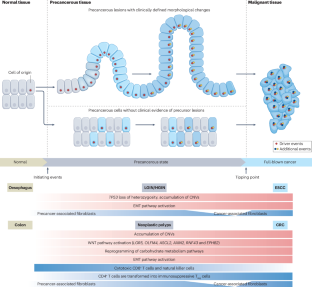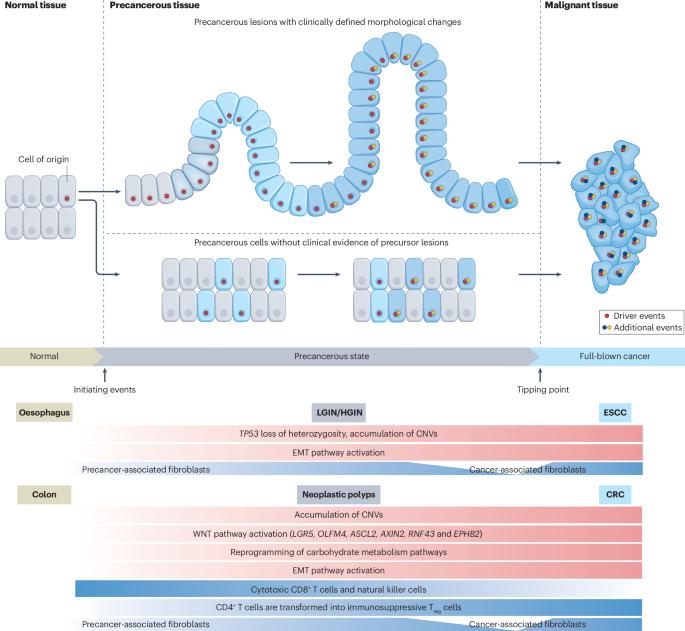Emerging strategies to investigate the biology of early cancer
IF 66.8
1区 医学
Q1 ONCOLOGY
引用次数: 0
Abstract
Early detection and intervention of cancer or precancerous lesions hold great promise to improve patient survival. However, the processes of cancer initiation and the normal–precancer–cancer progression within a non-cancerous tissue context remain poorly understood. This is, in part, due to the scarcity of early-stage clinical samples or suitable models to study early cancer. In this Review, we introduce clinical samples and model systems, such as autochthonous mice and organoid-derived or stem cell-derived models that allow longitudinal analysis of early cancer development. We also present the emerging techniques and computational tools that enhance our understanding of cancer initiation and early progression, including direct imaging, lineage tracing, single-cell and spatial multi-omics, and artificial intelligence models. Together, these models and techniques facilitate a more comprehensive understanding of the poorly characterized early malignant transformation cascade, holding great potential to unveil key drivers and early biomarkers for cancer development. Finally, we discuss how these new insights can potentially be translated into mechanism-based strategies for early cancer detection and prevention. Understanding the early steps of cancer development is crucial for cancer prevention. In this Review, the authors summarize the advantages and limitations of clinical samples, autochthonous mouse models and organoid models, alongside advanced techniques such as direct imaging, lineage tracing and AI, to enhance understanding of early cancer progression.


研究早期癌症生物学的新策略
癌症或癌前病变的早期检测和干预为提高患者生存率带来了巨大希望。然而,人们对癌症的发生过程以及非癌组织中正常-癌前-癌症的发展过程仍然知之甚少。部分原因是缺乏早期临床样本或合适的模型来研究早期癌症。在本综述中,我们将介绍临床样本和模型系统,如可对早期癌症发展进行纵向分析的自体小鼠和类器官或干细胞衍生模型。我们还介绍了新兴的技术和计算工具,包括直接成像、品系追踪、单细胞和空间多组学以及人工智能模型,这些技术和工具有助于加深我们对癌症起始和早期进展的理解。这些模型和技术有助于更全面地了解特征不清的早期恶性转化级联,为揭示癌症发展的关键驱动因素和早期生物标志物提供了巨大潜力。最后,我们将讨论如何将这些新见解转化为基于机制的早期癌症检测和预防策略。
本文章由计算机程序翻译,如有差异,请以英文原文为准。
求助全文
约1分钟内获得全文
求助全文
来源期刊

Nature Reviews Cancer
医学-肿瘤学
CiteScore
111.90
自引率
0.40%
发文量
97
审稿时长
6-12 weeks
期刊介绍:
Nature Reviews Cancer, a part of the Nature Reviews portfolio of journals, aims to be the premier source of reviews and commentaries for the scientific communities it serves. The correct abbreviation for abstracting and indexing purposes is Nat. Rev. Cancer. The international standard serial numbers (ISSN) for Nature Reviews Cancer are 1474-175X (print) and 1474-1768 (online). Unlike other journals, Nature Reviews Cancer does not have an external editorial board. Instead, all editorial decisions are made by a team of full-time professional editors who are PhD-level scientists. The journal publishes Research Highlights, Comments, Reviews, and Perspectives relevant to cancer researchers, ensuring that the articles reach the widest possible audience due to their broad scope.
 求助内容:
求助内容: 应助结果提醒方式:
应助结果提醒方式:


